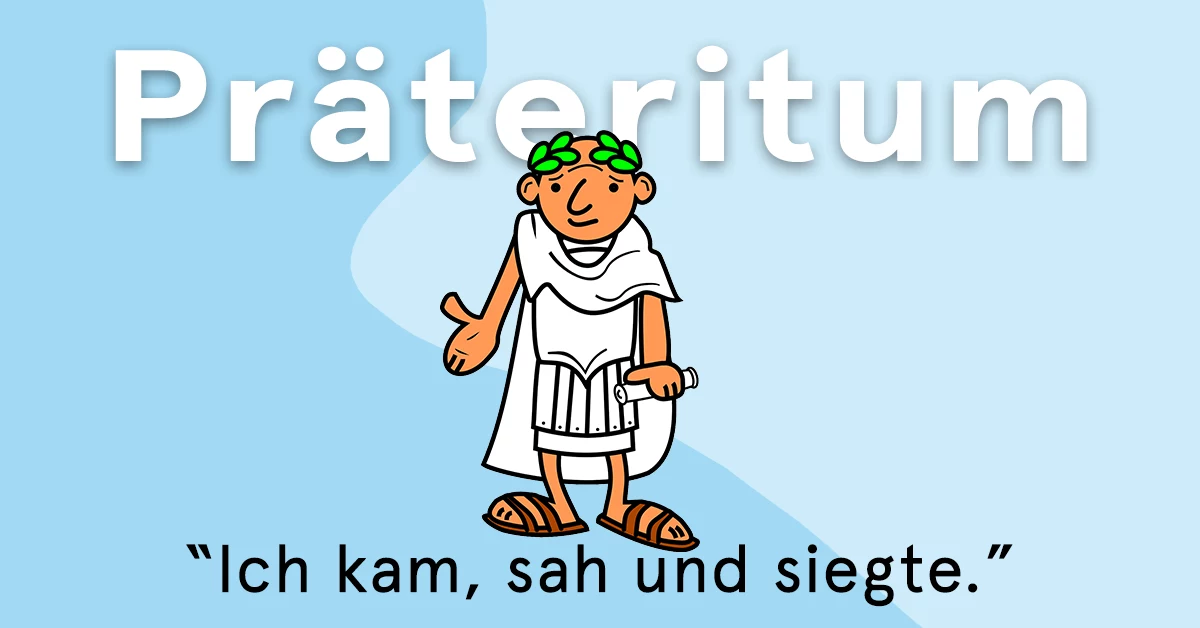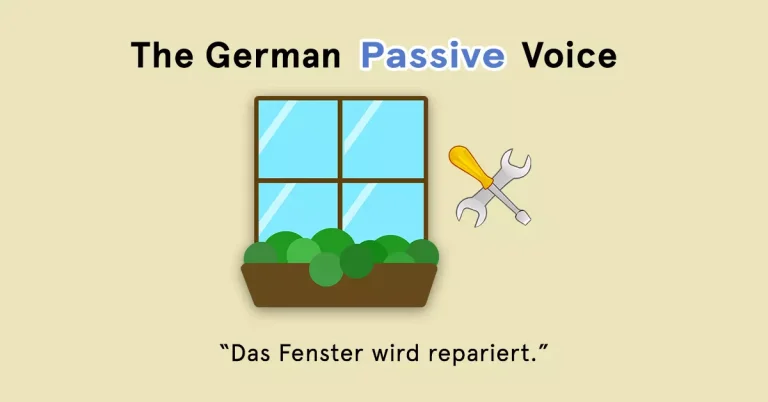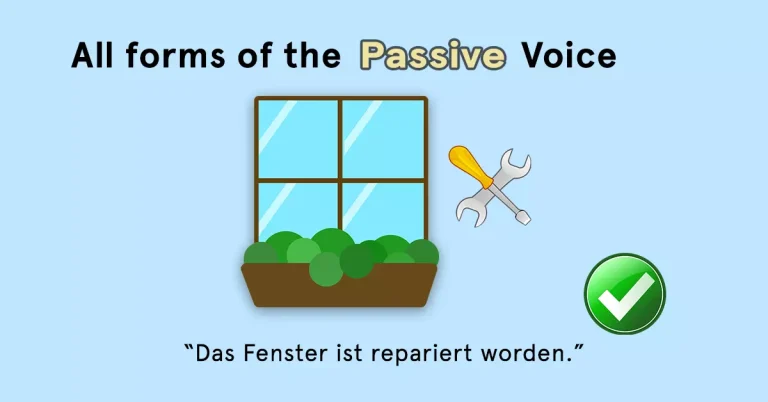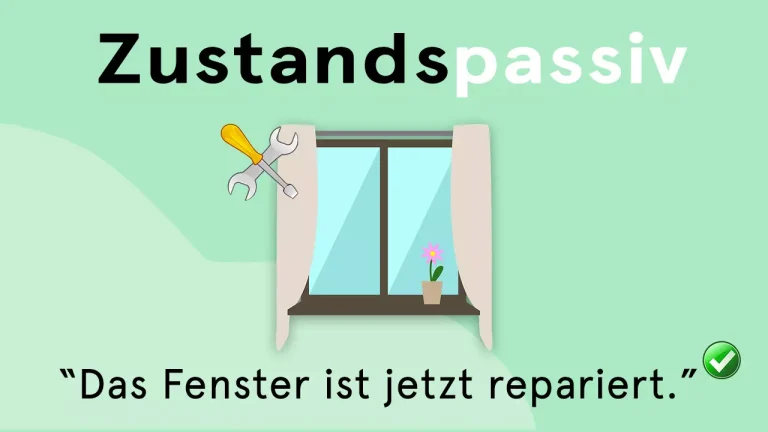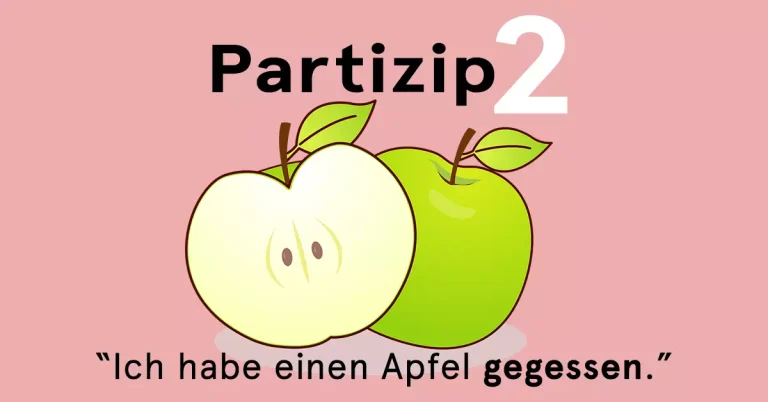This article teaches you all you need about the second most important German past tense: the German Präteritum tense. I’ll show you exactly how and when to use it. For spoken German you’ll need it a lot less than you might think.
Präteritum tense or Perfekt tense?
In your A1 and A2 German language course, you were probably first taught the past tense of sein and haben. For these two super important verbs you were taught their Präteritum forms (ich war, ich hatte) while you were taught the other past tense (Perfekt) forms for other verbs. And this tells us something very important: It basically depends on the verb which type of past tense you should use (for spoken German). The formation of the tenses is similar to their English equivalents, their usage, however is completely different.
In most cases it is not wrong to use either of the two past tense forms. It simply depends on how formal you want to sound. Only in very specific cases is it mandatory to use one over the other.
In spoken/informal German
In spoken German, we tend to use the Perfekt instead of the Präteritum for 99% of all German verbs.
(1) Gestern wachte ich sehr früh auf.
(2) Gestern bin ich sehr früh aufgewacht.
This means that (2) is A LOT more common in spoken German than (1). You will sound very formal if you use the Präteritum with “aufwachen”, or with most verbs for that matter. With some verbs you will even sound like you travelled from a past century with a time machine 🙂 – just like in the following example.
(3) Ich aß einen Apfel.
(4) Ich habe einen Apfel gegessen.
Please note that we need to add an asterisk to our rule of thumb (Perfekt tense for spoken German). A handful of verbs are commonly used in the Präteritum without making the sentence sound very formal. These include: sein, haben, werden and the modal verbs. Scroll down for a complete list.
(5) Ich war gestern sehr müde.
(6) Ich hatte viel Spaß auf der Party.
(7) Mein Fahrrad wurde gestohlen. (passive voice)
(8) Ich musste das Auto waschen.
However, it wouldn’t be wrong with these verbs to use to the Perfekt tense either. But keep in mind that the Präteritum is more common with these verbs.
(9) Ich bin gestern sehr müde gewesen.
(10) Ich habe viel Spaß auf der Party gehabt.
(11) Mein Fahrrad ist gestohlen worden. (passive voice)
(12) Ich habe das Auto waschen müssen.
Takeaway: For spoken German use the Perfekt tense. A handful exceptions include the verbs sein, haben, werden and the modal verbs.
In written/formal German
We use the German Präteritum especially in the written language like literature, (news) reports as well as in very formal spoken German.
Als Gregor Samsa eines Morgens aus unruhigen Träumen erwachte, fand er sich in seinem Bett zu einem ungeheueren Ungeziefer verwandelt. Er lag auf seinem panzerartig harten Rücken und sah, wenn er den Kopf ein wenig hob […]
(Beginning of Kafka’s “Die Verwandlung”.)
In news reports you sometimes find texts with mixed past tense forms: some verbs are used in the Präteritum while others are used in the Perfekt tense.
Takeaway: For formal written and formal spoken German you can use the Präteritum.
Mandatory Perfekt tense
The perfect tense is only mandatory in one case: when speaking in the present tense about an action that was completed shortly before.
Schau mal, es hat geregnet (not: *regnete). Die Straßen sind ganz nass.
Look, it has been raining. The streets are (very) wet.
Mandatory Präteritum tense
This is very rare. There are 4 important verbs with prepositions or infinitive constructions that can only be used in the Präteritum:
drohen zu:
Die Mauer drohte einzustürzen.
The wall was in danger of collapsing
pflegen zu:
Mein Großvater pflegte nach dem Essen spazieren zu gehen.
My grandfather used to go for a walk after dinner.
scheinen zu:
Das Essen schien ihm zu schmecken. / Er schien das nicht gewusst zu haben.
He seemed to like the food. / He didn’t seem to know that.
stammen aus:
Mein Großvater stammte aus Kolumbien.
My Grandfather was from Colombia.
The first three verbs of this list can also be used without the infinitive construction. In this case they have a more literal meaning and the Perfekt tense is possible (and a lot more common).
drohen (to be in danger vs. to threaten)
Er hat mir gedroht.
He threatened me.
pflegen (… used to do sth. vs. take care of sb.)
Ich habe meinen kranken Großvater gepflegt.
I took care of my sick grandfather.
scheinen (to shine vs. to seem)
Gestern hat die Sonne geschienen.
The sun was shining yesterday.
The next subchapter discusses some more verbs like this (literal vs. figurative meaning).
Finden, laufen, geben and gehen
With these three verbs it depends on the meaning, just like we’ve seen in the previous subchapter. In the more literal sense, the Perfekt tense is preferred in spoken German whereas the Präteritum is used in the more figurative meaning. For the figurative meaning, the Perfekt is less common for finden, laufen and geben and not used AT ALL for gehen:
- finden(find a physical object vs. express your opinion)
Sie hat nach langem Suchen ihren Schlüssen gefunden.
Ich fand den Film gar nicht gut. - laufen (to walk/run vs. to progress/succeed)
Er ist nach Hause gelaufen.
Wie lief die Prüfung gestern? (also: Wie ist die Prüfung gestern gelaufen?) - geben (to give sth. vs. to exist)
Er hat mir den Schlüssel gegeben.
Es gab leider viele Probleme. (es gibt = there is/are) - gehen (to go to a place vs. be possible/be about)
Er ist gestern einkaufen gegangen.
Ich konnte nicht kommen. Es ging leider nicht.
Im Meeting ging es um das neue Projekt.
Regional differences
In the North of Germany you will come across more Präteritum forms both in spoken and in written German than in the South, where – in some regions/dialects – the Präteritum has even almost disappeared completely.
Regular Präteritum tense forms
The preterite forms of regular verbs are formed by adding the preterite endings -te, -test, -te, -ten, -tet and -ten to the verb stem. The stem is formed by separating the ending -en or -n from the infinitive form of the verb. Verbs that end in “ten” or “den” take an extra “e” before the preterite endings.
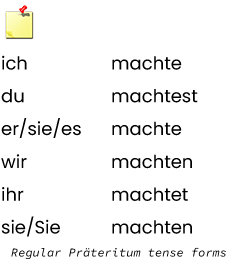
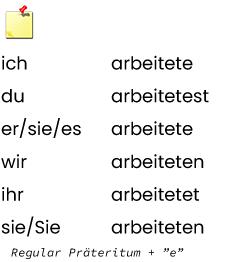
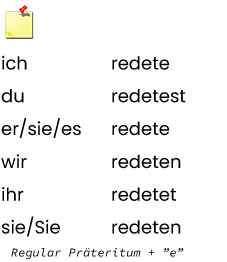
Irregular Präteritum tense forms
You probably guessed it: There are quite a few irregular Präteritum forms. Most irregular verbs changel their vowel and they do not have a verb ending for the 1st and the 3rd person singular (unregelmäßige Verben). Some change their vowel but do keep the normal (regular) verb endings (Mischverben)*.
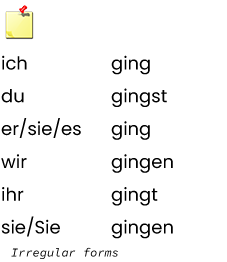

The most important Mischverben (change in stem, but normal endings) are: können, dürfen, müssen, mögen, wissen, brennen, bringen, denken, haben, kennen, nennen, rennen.
*You can check out this website for more information on these groups and classifications.
List of important verbs often used in the Präteritum tense
The following verbs are commonly used in the Präteritum, even in informal language:
1) sein, haben, werden
2) the modal verbs
3) the positional verbs (liegen, stehen, sitzen, hängen)
4) a handful of other verbs (see table below)
You should try to memorize these. For all other verbs the Präteritum is pretty rare, except for very formal German (cf. above).
For the A2 level, it’s enough to know the Präteritum forms of groups 1) and 2). For the B1 level, I recommend you learn the forms of group 3), as well. And for the B2 level, you can add group 4) to your repertoire. Advanced learners (C1+), and especially if they want to be able to use very formal written German, can try to memorize the Präteritum forms of all verbs. The most important irregular forms you can find below this table.
Note that this list includes regular and irregular forms.
| Infinitive form | Stem Change present tense | English translation | Präteritum form | Partizip 2 +auxiliary |
| 1) | ||||
| sein | irregular | be | war | ist gewesen |
| haben | irregular | have | hatte | hat gehabt |
| werden | irregular | become | wurde | ist (ge)worden |
| 2) | ||||
| dürfen | irregular | may | durfte | hat gedurft |
| können | irregular | can | konnte | hat gekonnt |
| mögen | irregular | like | mochte | hat gemocht |
| müssen | irregular | must | musste | hat gemusst |
| sollen | irregular | shall | sollte | hat gesollt |
| wollen | irregular | want | wollte | hat gewollt |
| 3) | ||||
| liegen | lie | lag | hat gelegen | |
| hängen | hang | hing | hat gehangen | |
| sitzen | sit | saß | hat gesessen | |
| stehen | stand | stand | hat gestanden | |
| 4) | ||||
| bleiben | stay | blieb | ist geblieben | |
| brauchen | need | brauchte | hat gebraucht | |
| denken | think | dachte | hat gedacht | |
| finden | find | fand | hat gefunden | |
| geben | e -> i | give | gab | hat gegeben |
| gehen | go | ging | ist gegangen | |
| halten | a -> ä | hold | hielt | hat gehalten |
| kennen | know | kannte | hat gekannt | |
| kommen | come | kam | ist gekommen | |
| laufen | a -> ä | walk | lief | ist gelaufen |
| meinen | think; mean | meinte | hat gemeint | |
| sagen | say | sagte | hat gesagt | |
| wissen | ich weiß du weißt er weiß | know | wusste | hat gewusst |
List of irregular Präteritum tense forms
This is a list of irregular Präteritum forms. The previous section I showed you verbs that are commonly used in the Präteritum, even in spoken German. If this topic is still difficult for you, I recommend you focus on the last table.
Learner at the C1 or C2 level might need more Präteritum forms for written German, in which case you can refer to the following table:
| Infinitive form | Stem Change present tense | English translation | Präteritum form | Partizip 2 +auxiliary |
| backen | (a -> ä) | bake | backte, (buk) | hat gebacken |
| befehlen | e -> ie | command, order | befahl | hat befohlen |
| beginnen | begin | begann | hat begonnen | |
| beißen | bite | biss | hat gebissen | |
| bieten | offer | bot | hat geboten | |
| bitten | ask for, request | bat | hat gebeten | |
| braten | a -> ä | fry | briet | hat gebraten |
| brennen | burn | brannte | hat gebrannt | |
| bringen | bring | brachte | hat gebacht | |
| denken | think | dachte | hat gedacht | |
| empfehlen | e -> ie | recommend | empfahl | hat empfohlen |
| essen | e -> i | eat | aß | hat gegessen |
| fahren | a -> ä | drive; go | fuhr | ist gefahren |
| fangen | a -> ä | catch | fing | hat gefangen |
| fliegen | fly | flog | ist geflogen | |
| geben | e -> i | give | gab | hat gegeben |
| gehen | go | ging | ist gegangen | |
| genießen | enjoy | genoss | hat genossen | |
| gewinnen | win | gewann | hat gewonnen | |
| haben | irregular! | have | hatte | hat gehabt |
| halten | a -> ä | hold | hielt | hat gehalten |
| heißen | “be called” | hieß | hat geheißen | |
| helfen | e -> i | help | half | hat geholfen |
| kennen | know | kannte | hat gekannt | |
| kommen | come | kam | ist gekommen | |
| lassen | a -> ä | let; leave | ließ | hat gelassen hat [Inf.] lassen |
| laufen | a -> ä | walk | lief | ist gelaufen |
| leiden | suffer | litt | hat gelitten | |
| leihen | borrow; lend | lieh | hat geliehen | |
| lesen | e -> ie | read | las | hat gelesen |
| liegen | lie (on a couch) | lag | hat gelegen | |
| lügen | lie (not speak truth) | log | hat gelogen | |
| nehmen | ehm -> imm | take | nahm | hat genommen |
| nennen | call | nannte | hat genannt | |
| raten | a -> ä | guess | riet | hat geraten |
| rennen | run | rannte | ist gerannt | |
| rufen | shout | rief | hat gerufen | |
| scheinen | appear; shine | schien | hat geschienen | |
| schießen | shoot | schoss | hat geschossen | |
| schlafen | a -> ä | sleep | schlief | hat geschlafen |
| schließen | close | schloss | hat geschlossen | |
| schneiden | cut | schnitt | hat geschnitten | |
| schreiben | write | schrieb | hat geschrieben | |
| schreien | scream | schrie | hat geschrien | |
| schwimmen | swim | schwamm | hat/ist geschwommen | |
| sehen | e -> ie | see | sah | hat gesehen |
| sein | irregular! | be | war | ist gewesen |
| singen | sing | sang | hat gesungen | |
| sitzen | sit | saß | hat gesessen | |
| sprechen | e -> i | speak | sprach | hat gesprochen |
| stehen | stand | stand | hat gestanden | |
| stehlen | e -> ie | steal | stahl | hat gestohlen |
| steigen | rise; ascend | stieg | ist gestiegen | |
| sterben | e -> i | die | starb | ist gestorben |
| streiten | fight, quarrel | stritt | hat gestritten | |
| tragen | a -> ä | carry; wear | trug | hat getragen |
| treffen | e -> i | meet | traf | hat getroffen |
| treiben | drive; do; engage in | trieb | hat getrieben | |
| trinken | drink | trank | hat getrunken | |
| tun | do | tat | hat getan | |
| vergessen | e -> i | forget | vergaß | hat vergessen |
| verlieren | lose | verlor | hat verloren | |
| wachsen | a -> ä | grow | wuchs | ist gewachsen |
| waschen | a -> ä | wash | wusch | hat gewaschen |
| werden | irregular! | become | wurde | ist geworden ist [Part. 2] worden |
| werfen | e -> i | throw | warf | hat geworfen |
| wissen | irregular! | know | wusste | hat gewusst |
| ziehen | pull; move (house) | zog | hat gezogen ist gezogen (move) | |
| zwingen | force | zwang | hat gezwungen |
Recap
- You can use the Perfekt tense in spoken German for most verbs.
- Exceptions: Haben, sein, werden and modal verbs and a handful of other verbs are commonly used in the Präteritum – even in spoken German.
- Very formal German: Use the Präteritum!
- The regular forms add the endings “te”, “test”, “te” … to verb stem. (machen -> machte)
- But there are lots of irregular verbs, which change their vowel. Most of them have no personal ending for the 1st and 3rd person singular (kam, kamst, kam …).
Präteritum tense FAQ
What is Präteritum in German grammar?
Präteritum (das Imperfekt; engl.: preterite, simple past tense) is a German tense used to describe an action or an event in the past. With most verbs it’s only used in formal German: news reports, literature etc.
What is the difference between Präteritum and Perfekt?
Simply put, with most verbs the Perfekt tense is used for spoken, informal communication while the Präteritum is used for official, formal communication, especially in written German.
How is the Präteritum formed?
For the regular verbs you simply add the endings -te, -test, -te, -ten, -tet and -ten to the verb stem (infinitive form minus “-en” or “-n”): machen -> ich machte
Further reading: You can read my article on the Partizip 2, which is used to form the most important German past tense, the Perfekt: The Partizip 2 – forms and usage
- What Präteritum forms do you use regularly?
- How do you memorize irregular verb forms? Any tips?
- Or maybe you have a question on the matter? Feel free to write a comment!
